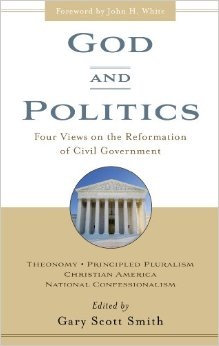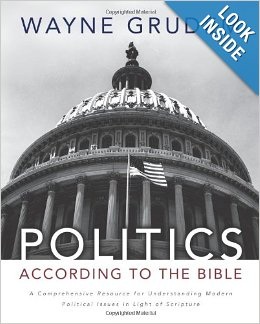In order to avoid as much misunderstanding as I can, let me clarify what I just said. Firstly, citizens of the United States have a moral duty to bring peace to the Middle East. This does not, by necessity, mean the government (by use of military power) has a moral duty (or even a right) to bring peace to the Middle East (though it could be the case in certain circumstances). Secondly, we have a duty to bring peace to the Middle East. This does not, by necessity, mean our goal is to bring democracy.
So how do citizens of the U.S. bring peace to the Middle East?
I'm okay with that though for the intended purposes of this post.(2) My point in all this is not to explain the relationship between those three political sovereigns (or two - again I'm still unclear on the details), but my point is simply to ask, from a Biblical perspective, how should the U.S. be involved?
Should the U.S. impose sanctions against Russia? Should the U.S. send aid to Ukraine? The answers to those questions will, in part, depend on how we define the U.S. Should the U.S. (as in the U.S. government) impose sanctions against Russia? Should the U.S. (as in private American citizens) send aid to Ukraine? Here is where it gets a little more sticky. But regardless of how we're defining the terms and how sticky the situation is, as Christians, we still need to think of it in terms of Christian ethics (that is, in terms of what we ought to do regarding the situation according to God's Word and the Lordship of Christ in our lives). And indeed, we ought to do something... But what is it that we ought to do?
Among those four views, with the exception of one (which will be explained later), they are all saying the same thing - the law of God is to be the very foundation from which all our modern laws are to be derived.
What I am advocating is that believers in Christ ought to understand the significance of abortion, that they have an obligation to do something about it, and that they are able to do something about it.
To be sure, what each believer does to contribute will look different, just as it would in stopping sex-trafficking and other terrible crimes against our neighbors(1), but it is still true that all who are in Christ have an obligation to love their neighbors (Gal. 5:14). And this means all Christians have an obligation to do something about abortion.
But you need to keep in mind two things (among the others covered further down): (1) It’s not a matter of your wallet, but a matter of what is right in God’s eyes (Mt. 6:24), and (2) you’re not just voting for something that affects you; you’re voting for what affects your entire community. Who doesn’t want their property value to go up? Yet as a believer, are you willing to say it’s okay to go force your neighbor to apportion some of his own earnings toward keeping your property value up? Is that really loving your neighbor?
But I don't want to get ahead of myself. First let me assure you of the things that I am not saying: On 2/28/13 Steve McSwain was published in the Huffington Post's Religion section with the following article:
6 Things Christians Should Just Stop Saying The list is pretty straight forward, although he does some lengthy elaborations on some of the points. But in summary, here are the six things which a fellow(?)-Christian(1) says all other Christians really need to stop saying:
While I wanted to respond back then, I didn't really have a forum to do so; and I also didn't really have the time until just recently (preparing for the birth of our daughter, learning how to be a Dad to a newborn, going through an unexpected job change, etc.). Nonetheless, now that I do have time, I'd like to do something of my part in protecting (or encouraging) the flock, and give (by God's grace in me) what I believe is a Biblical response. Of all the wicked heresies and threatening movements facing the church in our day, when Westminster Seminary finally organized their faculty to write something in unison, they gave their determined political efforts: not to fight socialism, not to fight homosexuality, not abortion, not crime and mayhem in our society, not subjectivism in theology, not dispensationalism, not cultural relativism, not licentiousness, not defection from the New Testament, not defection from the Westminster Confession of Faith, all of which are out there, and they could give their legitimate efforts to. Boy the thing they had to write about - was Theonomy! 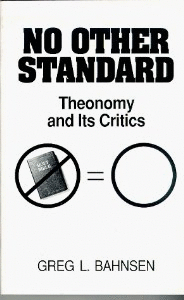 The Emperor Has No Clothes...still! In 1973, Greg Bahnsen graduated from Westminster Theological Seminary (Philadelphia, PA) with two Master’s degrees (M. Div, Th.M.). His thesis, approved by the overseeing faculty, was “The Theonomic Responsibility of the Civil Magistrate,” in which he set out to establish the theological premise that unless otherwise indicated by further revelation from God Himself, God’s law, including the civil penal sanctions, has moral abiding validity. From the encouragement of his professor John Frame, he reworked this thesis so that it could be published as a book. In 1977 it was published as Theonomy in Christian Ethics. You can see my review for that work here. In 1990 a book titled Theonomy: A Reformed Critique was published as a joint venture from the faculties at both Westminster Theological Seminaries (Philadelphia, PA and Escondido, CA) to establish a “Reformed answer” to Greg Bahnsen’s work (it took 17 years - from the date of his thesis - to formulate a “response”). In 1991, Bahnsen himself responded to their “critique” with this book, No Other Standard. If you’ve ever wondered if there were any gaping holes in the Theonomic perspective of theology, this book will settle the matter. In his normal fashion, Bahnsen applies the doctrines of Scripture with rigorous logical skill to show that God’s Word must be our standard in all matters of life - including politics and socio-political ethics. 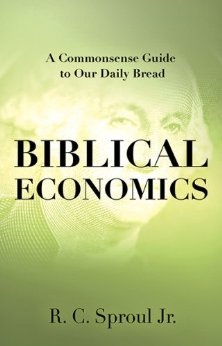 A Greatly Needed Work in American Churches This is a terrific primer on the Biblical view of economics. And it is immensely needed in our churches in America - if nothing more than to demonstrate the following: “That the Bible is not an economics textbook does not mean that it is totally useless for understanding economic issues. … Where ethics touches economics, the Bible is relevant.” (p. 16) In this short but greatly useful book, R.C. Sproul Jr. gives a Scriptural presentation of stewardship, property, profit, money, inflation, debt, poverty, equity, government, and more. The book is very readable and has solid practical value. I would recommend it to every Christian minister and layperson alike. Not only is it edifying in personal use, but I think it would be highly valuable for a small group study as well. Get this book and read it with Scripture! Book Review: Economics in One Lesson: The Shortest & Surest Way to Understand Basic Economics6/1/2013 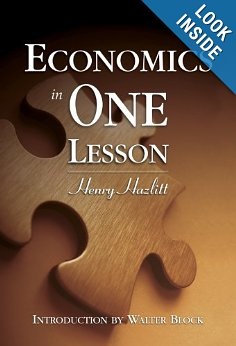 A Must Read for Politicians and Laymen Alike This is a very good and timely book. It’s a downright shame that it was written in 1946 and governments around the world have not heeded the simple lesson and practical applications advanced in this work. It’s divided into three sections: Part One: The Lesson With one chapter, “The Lesson” - in which he asserts: “The art of economics consists in looking not merely at the immediate but at the longer effects of any act or policy; it consists in tracing the consequences of that policy not merely for one group but for all groups.” (p. 17) Part Two: The Lesson Applied Here is the bulk of the book in which he goes into the particulars of applying that one simple lesson to various situations, including (but not limited to): public works programs, taxes, tarrifs, governments “rescuing” businesses, price-fixing, rent control, minimum wage laws, unions, profits, inflation, and saving. He ends the section with a restatement of the lesson and how if applied it would enable success on such a grander scale than what we’ve come to see in our own lifetimes since the government did not apply this lesson but did just the opposite. 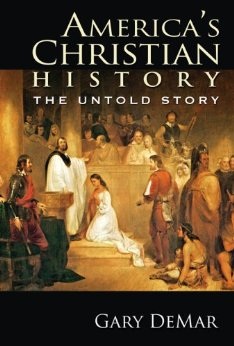 Gary DeMar does a wonderful job of showing the true historical Christian roots of our nation without unduly sanitizing the founding fathers. This book does a number of things in the way of being a great primer to American history: (1) Analyzes the role of government censorship, shows how it worked (in a bad way) throughout statist nations in history, and demonstrates the way it has happened and is continuing to happen in America today. (2) Demonstrates from primary sources the original intent of the colonizing of America, the first charters, and the Christian great commission assumption of the early settlers up through the forming of the new nation. (3) Handles the founding documents in their historical context, showing the true Christian nature of them - that is, even when the founding fathers were not all-together orthodox Christian, they still affirmed the necessity of the general principles of the Christian faith in order for the country to succeed. (4) Addresses several misconceptions of what the founding fathers, founding documents, and other items do and do not say - in their historical context - over against what is taught in government-run public schools today in America. It's a great read and a great reference. 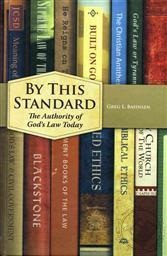 A terrific condensed book from his much larger workTheonomy in Christian Ethics. (If you're comparing page numbers it might be hard to see that since it goes from TiCE 563 pages to BTS 350 pages. But TiCE has 563 - 6"x9" pages - while BTS has 350 - 4"x6.75" pages. This makes a huge difference.) By This Standard is in many ways better than Theonomy in Christian Ethics in that it doesn't read like a master's thesis, is more digestible in its chapter lengths, is aimed at a broader audience thus more accessible for the layman, and has a great succinct section at the end refuting criticisms of his previous work on the topic. The main point of this book though is still the same: by what standard shall nations decide what is just in socio-political laws? By the standard God has revealed in Scripture. For a review of that main point, see my review of Theonomy in Christian Ethics. As for this book, Bahnsen applies the same principles of argumentation and clear exegesis but presents it in an easier tone. Of course this means his argument is not as exhaustive in this book; but it still carries the same weight. Chapter by chapter he uses Scripture over and over again to present the case. And just as before, while it is hard psychologically and emotionally sometimes to reach the conclusions he does. There doesn't seem to be any Biblical or logical reason not to come to the same conclusion. I hope every Christian interested in the Christian life, the Christian's role in social responsibility, or the nature of law, justice, and/or crime and punishment will read this book - if nothing else to at least see a view presented from Scripture that is not advocated that much today but is very hard to combat (Acts. 26:14). One major reason I'm voting for Romney and a Republican Senate, and why I think you should too…11/1/2012 Of course I neither blanket endorse everything Romney says or stands for nor that of a Republican Senate. And I certainly realize there are several reasons to vote for Romney and a Republican Senate (or several reasons not to as your case may be). But I do think some issues are more important than others. And I personally have a strong conviction about government and its role to protect life (Rom. 13:1-7) by enforcing certain laws in society - in particular, "You shall not murder" (Ex. 20:13). And yes, I'm talking about abortion.
But before I get into that, let me at least give a very scratch-the-surface take on what it seems the Bible has to say about the Christian responsibility in politics. It's true that nowhere in the Bible did there exist a democratic republic form of government that we have here today in the U.S. (at least that we're supposed to have here in the U.S.). But that doesn't mean the Bible has nothing to say regarding the believer's involvement in politics. To start, even the New Testament says the government ordained is to be for our good (Rom. 13:1-7) and that we have a responsibility to pray for the government leaders - and not just pray for them with no specific cause in mind, but to pray for them in a way so that "we may lead a peaceful and quiet life" (1 Tim. 2:1-2). It is also clear from the examples of both the Old and New Testaments that at least some of us have a responsibility (if not all of us who are in a position to do so - see Esther 4:12-17) to do what we can to persuade our government to do what is just and call our government officials out when they are violating God's standards for justice (Ex. 5:1; Judg. 2:16; 1 Sam. 13:8-14; 2 Sam. 12:5-7ff; 1 Kgs 13:1-2ff, 18:17-18, 21:17-19; Jer. 22:1-30, 27:1-11, 37:6-10; Esther 4:12-17; Matt. 14:3-4; Acts 4:19).
The great things about this book are the very detailed explanations of how our government is supposed to work (concerning how it was originally set up), how it's currently functioning, and some of the difficult issues that are dividing the nation. There really is a great deal of reference material in here and some truly sobering facts.
The down side to the book was how a Christian is actually supposed to respond. He argues that Christians should have significant influence in their government, and he presents some texts that indicate as much. And that is great! But he approaches the Scriptures with a very pick-and-choose attitude as to which texts actually apply to politics. 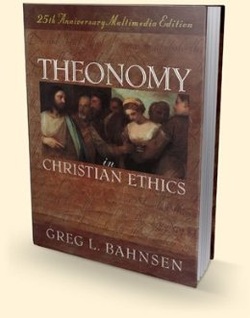 A Masterpiece of Theology, Philosophy, and Biblical Scholarship First let me say this: This book reads like a thesis (and as it started out as a thesis for a Master of Theology degree, that makes sense). But what a Biblically substantiated, exegetically sound, and theologically insightful thesis it is - by a truly gifted theologian, teacher, and communicator! It is so very rare that one comes across a book in which after finishing it he can say, "This book has truly altered the course of my life." If there is any one book - obviously apart from the Bible itself - of which this can be said by me, it is Greg Bahnsen's Theonomy in Christian Ethics. The theonomic principle as stated by Bahnsen is simply this: By "theonomy" I will mean that verbalized law of God which is imposed from outside man and revealed authoritatively in the words of Scripture" (p. 35). Theonomy is God's Law - over against man's self-law - applied in all areas of life, both in the church and in society. While throughout the history of the church it was taken on assumption that the Old Testament had abiding validity unless something in the New Testament was revealed to have cancelled or changed it in some way, in today's evangelical world just the opposite view seems to be the one most widely held: that unless a commandment is repeated in the New Testament, we should assume it no longer has abiding validity (a view with many more problems than one might think). And so Bahnsen lays out cogently, articulately, and (most importantly) Biblically in 563 pages his thesis that the Old Testament Law is just as much applicable today as it was in the days before Christ, even in the area of the civil magistrate. 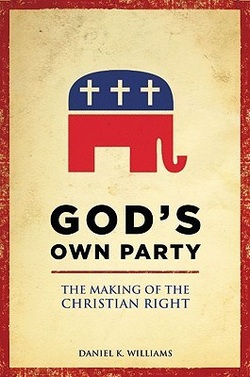 A Remarkable Narrative of Christian Involvement in Politics (and vice versa) Wow! A history of hope, a history of despair. A history of victory, a history of defeat. A story of people with character rising up in great courage and conviction, and a story of people with few principles giving up and giving in. And as these histories and stories occur on both the political and religious sides, Daniel K. Williams writes a remarkable, well-documented narrative of the birth and rise of Christian involvement in politics in the 20th and 21st centuries in America. Showing a mastery of historical facts in the political realm and even being able to distinguish between a fundamentalist and an evangelical in the Christian realm, Williams is clearly qualified to write about this subject with authority. And along with that authority he brings an amazing writing ability to continually engage the reader. Regardless of your views of the Democratic or Republican party (or even if you have a distaste for a two-party system), this book will certainly educate you on American history with regards to Christian fundamentalism, Evangelicalism, and the political strategies employed by both Democrats and Republicans as they begin to recognize the importance of the Christian vote in today's America. |
Categories
All
|


